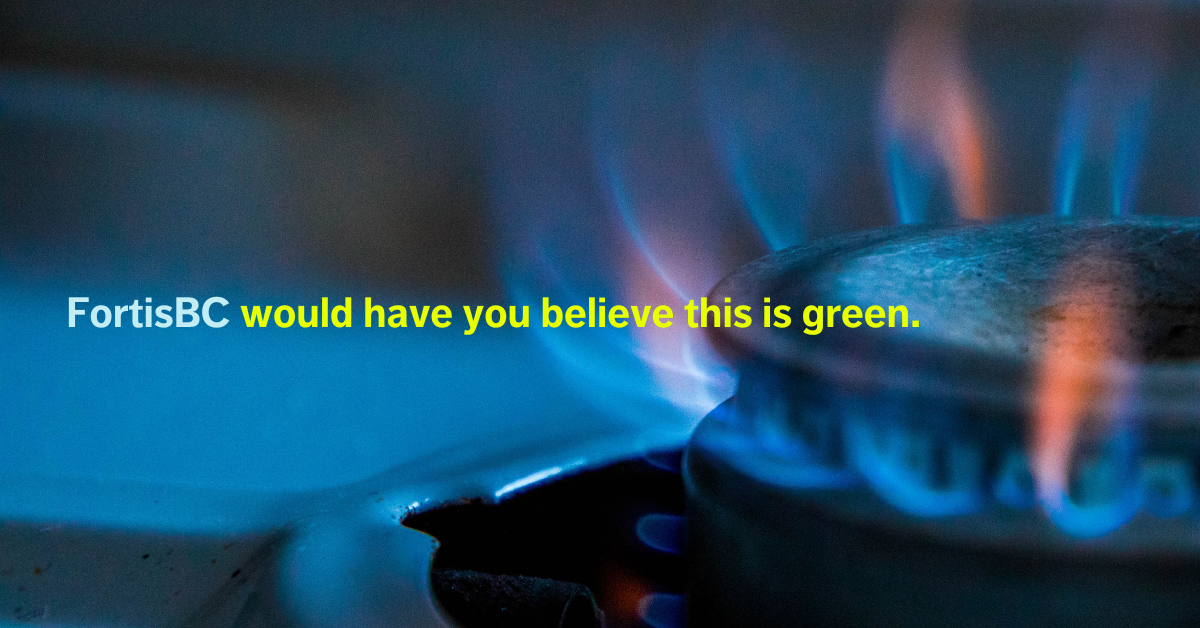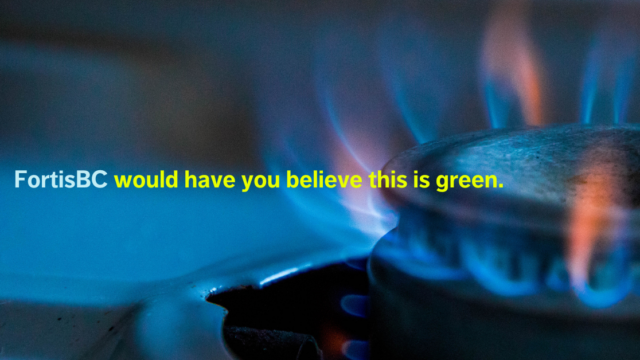VANCOUVER/UNCEDED xʷməθkʷəy̓əm (MUSQUEAM), Sḵwx̱wú7mesh (SQUAMISH) AND səlilwətaɬ (TSLEIL-WAUTUTH) TERRITORIES — Stand.earth and concerned B.C. residents, represented by lawyers from Ecojustice and Slater Vecchio LLP, are taking FortisBC to court for greenwashing its gas products in the middle of a climate and cost-of-living crisis.
The lawsuit claims that FortisBC has promoted the use of renewable natural gas and fossil gas to residential consumers, representing that these sources of home heating are always more cost-effective and as good or better for the environment than alternatives like electric heat pumps. Neither of these claims is true.
The company claims to care about climate action and affordability, but it continues to add 10,000 new gas consumers a year by advertising gas as a climate-friendly source of home heating. FortisBC has a near monopoly on the supply of gas to homes in the province and stands to benefit by encouraging people to buy new gas furnaces and lock themselves into using gas for decades. FortisBC emphasizes its renewable natural gas program to consumers, but almost all of the gas they deliver to British Columbians is from fossil fuels.
Electric heat pumps provide heating and cooling aligned with a fossil-free future, protect British Columbians from extreme heat, are cost-effective to run, and are in the long-term interests of many households in B.C. But because electric heat pumps threaten the demand for gas, FortisBC continues to promote gas over electric heat pumps.
The use of fossil fuels to power buildings is a major contributor to the greenhouse gas emissions that drive climate change. Emissions from buildings make up approximately 10 per cent of B.C.’s climate footprint, rising to more than 50 per cent of emissions in big cities, including Vancouver. The province will have a difficult time meeting its Clean BC climate goals without eliminating gas heating from buildings.
In this context, FortisBC is greenwashing its products and must be held accountable for deceiving consumers and contributing to emissions in the province.
Andhra Azevedo, Ecojustice lawyer, said:
“Greenwashing is rife and systemic in Canada, and this case alleges that FortisBC has deceived consumers into buying new gas furnaces and staying connected to the FortisBC gas system by promoting gas as climate-friendly and more affordable than alternatives like electric heat pumps. These claims are not true.
“The plaintiffs launched this legal challenge because FortisBC’s deception needs to end. The plaintiffs want to see FortisBC forced to stop peddling misinformation and instead tell consumers that continuing to use fossil fuels to heat homes is not a climate solution.”
Liz McDowell, Senior Campaigns Director at Stand.earth, said:
“Our case challenges FortisBC’s greenwashing campaign, which misleads customers into believing that heating our homes with gas is affordable and climate-friendly, when it is anything but. As communities across the province are recognizing the risks that gas appliances pose to the climate and passing a wave of low-carbon construction policies that encourage safe, affordable electric heat pumps instead, FortisBC spokespeople have engaged in high-pressure tactics to stall or block these efforts by presenting misleading information to the public and city councils across the province.”
Lori Goldman, B.C. resident and lawsuit claimant, said:
“The lawsuit we’re bringing says that FortisBC is worried about losing gas customers and is misleading people like me into using fossil gas for home heating or telling people to build new homes with gas appliances. It tells us that gas is cheap and climate-friendly. But this is false.
“FortisBC made many claims about its use of renewable natural gas. I was really interested in getting renewable natural gas to my home. I only discovered that FortisBC was misleading the public when I did follow-up research.
“FortisBC should acknowledge that it is contributing to greenhouse gas emissions and be upfront about what is being delivered to consumers who connect to gas.”
Eddie Dearden, B.C. resident and lawsuit claimant, said:
“I joined this case because I have seen FortisBC engage in large expensive promotional campaigns and push back against efforts made by people like myself, who are volunteering our time to raise awareness about our concerns with continuing to use gas in our homes.
“As a sustainable builder, I also see the effects of FortisBC ads in trade magazines and with my clients who are having to make choices between using gas or electricity in their homes. FortisBC’s promotion of gas has made people think that connecting to gas is climate-friendly — this is misleading.
“It should not be left for small businesses and residential home designers to inform British Columbians about the true nature of the substance they are bringing into their homes.”
Paul Manly, Nanaimo City Councillor, said:
“As a councillor for the city of Nanaimo, I experienced firsthand the heavy-handed lobbying that FortisBC has been leveraging to influence local municipalities to commit their communities to use their products. While the City of Nanaimo was in the process of implementing a Zero Carbon Step Code, Fortis pressured our mayor and council to change course by promising that every new residence in Nanaimo connected to gas would receive renewable natural gas if we did not implement the code. This misinformation was picked up by citizens who complained to council that we were blocking access to environmentally-friendly renewable natural gas.”
Melissa Lem, President of Canadian Association of Physicians for the Environment and B.C. family doctor, said:
“This case challenges FortisBC’s misleading ads, which encourage people to keep connecting to gas despite the consequences. On top of the overwhelming evidence that fossil gas use is accelerating climate change, CAPE has been raising the alarm that using gas to power our homes is harmful to people’s health – both inside our homes and in the communities where the gas is produced. North American research links gas stoves to 1 in 8 childhood asthma cases, and people living close to fracking sites in B.C. where gas is extracted have increased exposure to toxic volatile organic compounds VOCs, which have been linked to premature births, lung disease and cancer. In a province with an already overburdened healthcare system, we cannot afford ongoing expansion of natural gas use, no matter how it’s branded.”
Background:
- Stand.earth and two members of the public, represented by lawyers from Ecojustice and Slater Vecchio LLP, are bringing a case against FortisBC under the Business Practices and Consumer Protection Act for FortisBC’s deceptive practices.
- The lawsuit alleges that FortisBC’s advertisements exaggerate claims around the renewable natural gas in its system to get people to continue to connect to the gas system. Yet FortisBC omits that more than 90 per cent of the gas in its system is sourced from fracking in Northern B.C. and Alberta, a fossil fuel that is incompatible with a safe climate future.
- Further, FortisBC advertises that its renewable natural gas comes from “local” sources, despite the fact that the majority of this gas is not being produced or even delivered to consumers in B.C. Almost all of the gas delivered to a consumer in B.C. paying more for renewable natural gas is fracked gas, counter to what renewable natural gas advertisements of scenic trees and farmland would lead consumers to believe.
- FortisBC has claimed that its sources of renewable natural gas are certified by a third-party as carbon neutral. The lawsuit alleges FortisBC does not have a certificate for its RNG.
- The plaintiffs are seeking declarations, injunctions, and corrective advertising to prevent these misrepresentations from continuing.
About:
Ecojustice uses the power of the law to defend nature, combat climate change, and fight for a healthy environment. Its strategic, public interest lawsuits and advocacy lead to precedent-setting court decisions and law and policy that deliver lasting solutions to Canada’s most urgent environmental problems. As Canada’s largest environmental law charity, Ecojustice operates offices in Vancouver, Calgary, Toronto, Ottawa, and Halifax.
Stand.earth is a Vancouver-based global advocacy organization delivering large-scale change for our planet and its people by interrupting the systems that create environmental and climate crises. Our mission is to challenge corporations and governments to treat people and the environment with respect. Our worldwide community advocates for a climate-safe, equitable future, where environmental and climate justice policies uphold the dignity of people everywhere — at the scale our world requires.
Additional resources from the court filing:
Citations supporting the affordability and climate benefits of electric options
- Sarah Miller, Kate Harland, Christiana Guertin and Ricardo Pelai, “Heat Pumps Pay Off: unlocking lower-cost heating and cooling in Canada” (Canadian Climate Institute, 2023)
- District of Saanich, “Make the Switch: How upgrading from a natural gas furnace or boiler to a heat pump has cut costs and carbon pollution for British Columbia homeowners” (2023)
- Alexander Gard-Murray, Brendan Haley, Sarah Miller and Mattheiu Poirier, “The Cool Way to Heat Homes: Installing Heat Pumps Instead of Central Air Conditioners in Canada” (Building Decarbonization Alliance, Canadian Climate Institute, Efficiency Canada, Greenhouse Institute, 2023)
- Letter from B.C. Climate Solutions Council letter to the Minister of Environment and Climate Change Strategy, “Re: Greenhouse Gas Reduction Standard” (15 September 2023)
- Alex Ferguson and Jeremy Sager, Natural Resources Canada, “Cold-Climate Air Source Heat Pumps: Assessing Cost-Effectiveness, Energy Savings and Greenhouse Gas Emission Reductions in Canadian Homes” (Ottawa: Natural Resources Canada, 8 March 2022)
- BC Hydro, “Bringing the heat: British Columbians concerned over energy costs, unaware that going all in on gas does not make dollars or sense” (2022)
Examples of FortisBC’s greenwashing claims
- “local” sources or delivery of RNG “in the province” or throughout B.C.:
- RNG supply/overemphasis:
- Affordability:
- Climate:
- RNG carbon neutral certification:


